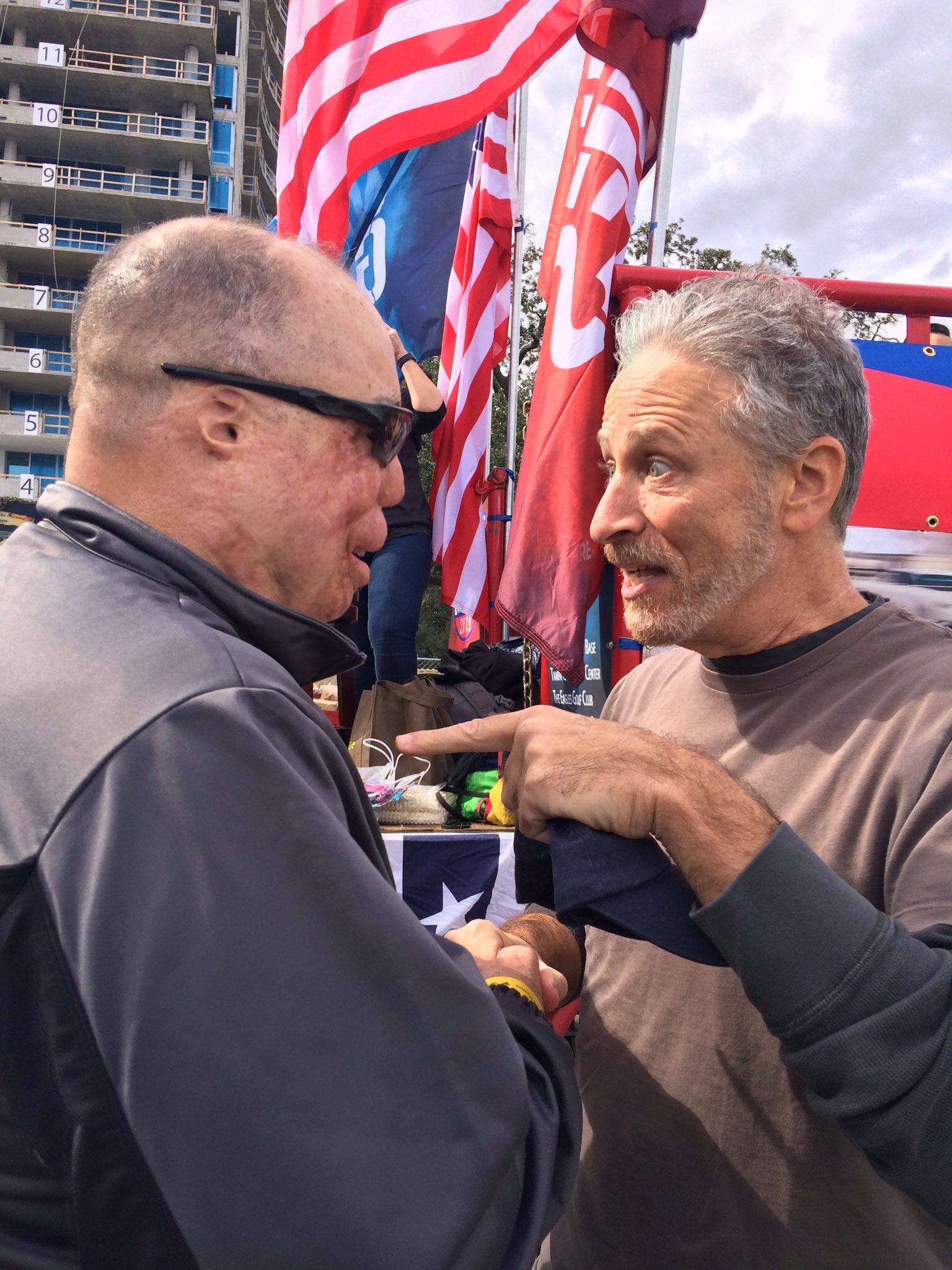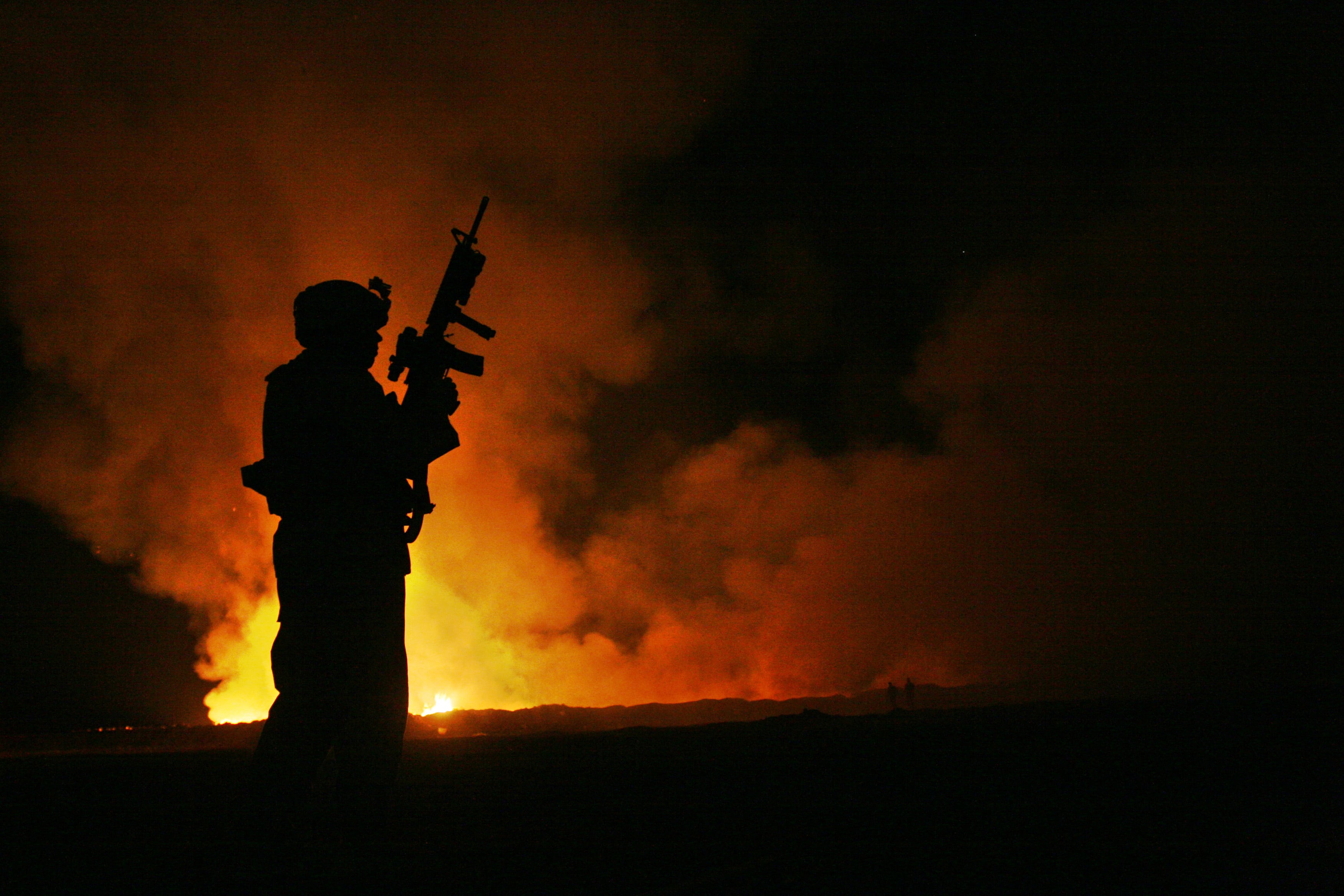Comedian Jon Stewart has a not-so-funny pitch on how to help veterans who are victims of war’s toxic exposures such as burn pits and a host of other lifelong damages. He wants an upfront fee paid by ‘war profiteers’ much like the contingency fees oil companies pay in case there is a spill.
“We’ve gotten really, really good in this country at saying we support the military and we put on the flag pin and we thank them for their service and we give them that 10 percent coupon for appetizers at Chili’s but the truth is, structurally, we have not done enough to address the wounds of war that they come home with whether they be brain injury, PTS, or these toxic exposures,” the former host of The Daily Show said.
Stewart spoke Tuesday during a live event hosted by the Washington Post also featuring Rep. Raul Ruiz, D-California, Sen. Thom Tillis, R-N.C., Derek Fronabarger with the Wounded Warrior Project and McClatchy reporter Tara Copp.
“I believe that in the way that oil and gas companies have to kick a 10 percent contingency on spills, I believe that war profiteers should kick in a 10 percent contingency plan so that Dereck and the VSOs and the frontline workers and veterans don't have to always come hat in hand begging for money because their brothers and sisters are still dying from the things that they saw and faced in downrange war zones,” Stewart said.

While only Stewart pushed forward the notion of a fee paid for by defense companies, all participants featured on the nearly hourlong event roundly agreed that especially those facing an array of health complications from burn pit exposures need to be given ‘presumptive’ connection rather than suffer through lengthy delays that sometimes are not resolved when the veteran dies of complications.
VA officials have previously fought against efforts to presumptively link burn pit exposure to health problems, saying there’s a need for more research.
Tillis said he supported an outside agency to study burn pit health concerns but also pushed for presumptive connection, which he said could actually help in the long run by allowing officials to “get ahead” of acute conditions and treat veterans before problems worsen over time.
The senator said that the government should “assume we’re responsible for the care and safety of veterans.”
Ruiz, a former emergency room doctor, has sponsored or co-sponsored numerous bills to expand the VA’s coverage and care of conditions believed to be related to burn pit exposure.
He highlighted two bills introduced last year, “The Right To Breath Act” which would legislate that nine pulmonary conditions would be qualifying for veterans under a presumption of service connection and receive care.
The other bill mentioned, “Jennifer Kepner Healthcare for Open Air Burn Pit Exposure,” would make veterans exposed to burn pits able to receive low-cost care from the VA.
Both bills remain in subcommittees after being introduced in mid-2019.
Stewart, who spent years advocating for health care coverage for 9/11 first responders and ground zero workers, has set veterans health in relation to burn pits and other burdens as his target.
The comedian noted the parallels that both the 9/11 worker population and veterans have faced — repeated denials of a connection to their health conditions and battling their own government for recognition and help.
“The system is set up to deny them the benefit,” Stewart said of the current setup that requires veterans to prove a service connection before receiving vital healthcare from the Veterans Health Administration.
Most recently he has been working with groups like BurnPits360, the Wounded Warrior Project and other Veterans Service Organizations to write a package of legislation to get stopgap measures introduced to cover health for those suffering and dying from toxic exposure-related conditions with the ultimate goal of a presumptive connection as the standard.
Copp, a former Military Times reporter, spoke with The Post about recent reporting from McClatchy that has focused on K2 exposure victims, those veterans who served at the Karshi-Khanabad Air Base, Uzbekistan from 2001 to 2005. The base was used by primarily U.S. forces for aerial missions into nearby Afghanistan to hunt Osama bin Laden, Al-Qaida and Taliban members.
But it was the site of massive, decades-long toxic and radioactive materials by the former Soviet Union.
Black goo and glowing retention ponds dotted the small base. And, Copp said, the Pentagon knew about it early yet did not inform troops stationed there. Some of those troops sought help but had little to no support proving their connection to the contaminated site.
Even currently, K2 is not classified in the correct category to be placed on the VA’s Airborne Hazards and Open Burn Pit Registry, she said.
Copp also referenced work McClatchy has done on the evidence of higher cancer rates among pilots, which some believe is connected to radiation exposure. Those findings have prompted a U.S. Air Force study to look back at data among pilots going back to 1970, she said.
Another bill in Congress seeks to broaden the research to pilots from all services.
Most efforts do have bipartisan support in these early stages, based on bill co-sponsorship.
As Stewart shared though, it may take a change in how the system is operated to see an effect on care for those in need.
“If we’re going to make them fight our wars then come home and fight for their lives, that’s just a model that has to change,” Stewart said.
Todd South has written about crime, courts, government and the military for multiple publications since 2004 and was named a 2014 Pulitzer finalist for a co-written project on witness intimidation. Todd is a Marine veteran of the Iraq War.





